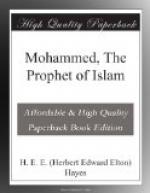So-called Moslem missionaries are spreading through the Press such idealistic and false views of the religion and character of Mohammed, that we need to be on our guard against them.
Unbiased historians have stated that there is much that is deplorable in the life of the prophet of Islam. And it is certain that his teaching has increased the degradation of the nations that have come under its influence.
Much of the literature that is being circulated in England by the “Moslem missionaries,” claims that Moslem women are better off, so far as property rights go, than their Christian sisters. However true this may be, it does not lift them out of the degradation of polygamy and concubinage, with a capricious system of divorce, which makes them the victims of the selfish baseness of their husbands and masters, which Mohammed himself sanctioned.
The following essay, it is hoped, will help to counteract the false ideas that are being scattered abroad, and lead those who read to study more deeply the problems and sorrows of millions of the Moslem subjects of our Gracious King.
The prayers of all Christians are asked on behalf of these millions, and for those who labour to preach the “unsearchable riches of Christ” amongst them.
H.E.E. Hayes.
Greenhithe:
July, 1914.
MOHAMMED
The Prophet of Islam.
By H.E.E. Hayes.
Introduction.
Just as the character of Jesus is stamped upon the religion which originated in His Person, so is the character of Mohammed impressed upon the system which he, with marvellous ingenuity, founded. The practical influence of Islam upon individual lives produces results that reflect unmistakably the character of its founder, and a careful study of the tenets of the system in relation to its history enable the student to estimate the real worth of the man.
As the Apostle of God, Mohammed is the ideal of every true Moslem. His life is the standard by which the lives of his followers are tested, although he himself confesses that his life was not holy. In the Koran, and the earlier traditions, he is pictured as being in no way better than his fellows, and as weak and liable to error as the poorest of his contemporaries. Yet later tradition minimises his faults and weakness, and surrounds his person with a halo of glory that makes him appear sinless and almost divine. All the doubtful incidents of his life are either eliminated and ignored, or assiduously supported and defended by his pious, misguided followers.




